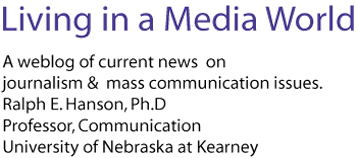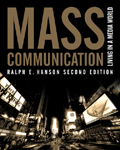
rhanson40@gmail.com
Chapter-By-Chapter
Readings and Links
for Mass Communication, Second Edition
Now Available

 |
Questions, comments or suggested links? Contact me at:
rhanson40@gmail.com Chapter-By-Chapter |
|||
 |
||||
Looking for Student BlogsI'm always looking for links to blogs being written by student journalists. If you have one, or know someone who does, drop me a note! Second Edition Available Now!The second edition of Mass Communication: Living in a Media World is now available at the very student-friendly price of $45. (Yes, the new edition sells for less than used copies often do of the first edition.) It features a newly strengthened media literacy focus, greater depth on a number of topics, extensive coverage of "long-tail" media, and new chapters on media effects and global media. For more information, visit the CQ Press website. Spring Break 2008Living in a Media World will be on spring break until the first week of April. See you then! Thursday - March 20, 2008Remembering The Man Who Invented Communication Satellites - Arthur C. Clarke He is best known for co-writing the screenplay for 2001 - A Space Odyssey, along with the novelization of the movie, the short story The Sentinel on which the movie was loosely based, and a long string of prominent "hard" science fiction stories. But he also wrote a fascinating WWII novel called Glide Path about the development of radar-based airplane landings. I grew up with the Clarke cannon, including Childhood's End, Rendezvous With Rama, and his short story collections. Tuesday - March 18, 2008Questions Worth Asking (Maybe)
Wednesday - March 12, 2008Appeals Court Stays Fines For Locy According to USA Today, a three-judge federal appeals court blocked the lower court's fines as Locy pursues an appeal of a contempt order designed to force her to testify as to who her sources were. The fines were to start out at $500 a day, growing from there to $1,000 and eventually $5,000 a day; the fines were set to begin Tuesday. Hatfill is suing the justice department for invading his privacy by naming him as a "person of interest" in the 2001 anthrax attacks. Hatfill was never charged in the case. The judge's initial contempt ruling required that Locy pay the fines herself without any outside assistance. Locy told the Charleston Daily Mail, "I'm not paying. I can't. You can't get blood form a stone. I don't have it." She went on to question why she would be forced to pay the fines without any help. "Even Mafia bosses and White House aides are permitted to have legal defense funds. Neither my family nor my friends can help me pay these fines, according to the judge. My students can't even hold a bake sale to help me. That, to me, seems a little extreme." Locy has received support in her case from a wide range of groups and individuals, including the Reporters Committee for Freedom of the Press. Other Coverage of the Locy Case:
Monday - March 10, 2008Who Do You Want As Face Book Friends & What Do You Want Them To See? Given that students can and do post just about anything on their Facebook pages, the question then becomes, who do you want seeing this information? Certainly not your parents. This was an easy issue in the early days of Facebook when Mom and Dad couldn't get an account. But now they can. So Sunday's Washington Post asks the question of whether your parents ought to be your Facebook friend (and hence have access to all the dirty laundry you post there)? I use Facebook quite a bit as a tool to communicate with my students, but I'm not a "friend" of my children. I figure there are just things I don't need to see. And I have not asked any of my sons' friends to be my friend. But oddly enough, a significant number of my eldest's peers have asked me to be their friend. They've invited an adult in. I am a Facebook friend of an adult nephew of mine, and I recently asked if he were going to post a photo of his girlfriend to Facebook. Here's his reply: "I may or may not put the photo up on Facebook. I'm in an anti-Facebook mode these days. Not so much "anti keeping up with my friends on Facebook", but more, "anti-people I never talk to/work with/hardly know keeping tabs on me through Facebook." Last night I purged a few non-friends from my "Facebook friends" and took out some pictures. My buddy Luke has been trying to convince me that Facebook is the Anti-Christ, and while I don't fully agree with him, I can at least see some of his arguments for why it can be creepy. I think the next step will be creating a limited profile for people from work that I need to remain friends with on Facebook due to Facebook politics. ....and I think you know what I mean by Facebook politics (who is your friend, when is it appropriate to friend someone, who you stay separate from, etc...). There's no good way to be friends on Facebook with all of them without being able to limit some people from seeing your embarrassing pictures without either cutting off everyone or no one. " Some food for thought. Thursday - March 6, 2008Just Because It's Non-Fiction Doesn't Make It True Dept. What is more interesting to me is how important it seems to be to people that stories be true. They don't want fantastic stories to be fiction. They want to believe. Israeli filmmaker Eran Kolirin is reportedly annoyed that he keeps getting asked whether his movie telling the story of a group of Arab musicians lost in Israel is true. Or if you go back to the Coen brothers brilliant film Fargo... It starts off with a title card that says: "This is a true story. The events depicted in this film took place in Minnesota in 1987." Only the card was just a joke by Joel and Ethan Coen. And given that it was a fictional comedic crime story, what was so bad about including a fictional disclaimer at the beginning? Other than the fact that a lot of people thought it was true. Living in a Media World Archive |
Ralph Hanson's
|
|